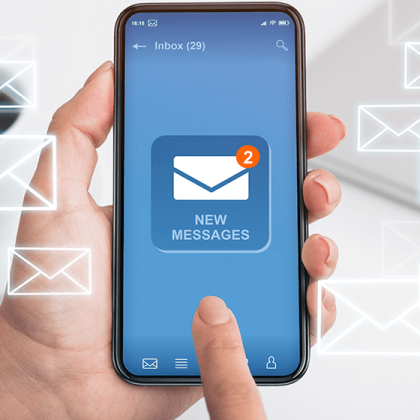Feature your business, services, products, events & news. Submit Website.
Breaking Top Featured Content:
7 Places You Can Use Tech To Boost Your Small Business Marketing

You’ve clicked on the title for this article. And you now read it voraciously. So you probably run a small business. Small business owners look to grow their businesses. And that means targeting your market efficiently with the lowest acquisition costs. Attract the right type of qualified leads. But realize this is easier said than done.
Good businesses respond to marketing that appeals directly to their mission, and ensuring that your team is ready to deal with that specific class of clientele can be challenging.
Luckily, there are a lot of lots of technologies to help with targeting your customers and getting qualified leads to sign up for a demo of your product or service. While finding the right technology may take some trial and error, there are several options worth considering.
Marketing Tech, and Tactics, to Consider
You’ll find marketing to small businesses more complicated, But the following methods can help carry the load:
1. Use AI to Keep it Personal
Yes, it can sound daunting at first. But artificial intelligence remains the single most underused technology in small business marketing. Make content specifically tailored to your target clients. Manage your overall marketing strategy. And manage your different accounts. Complete these tasks with the help of AI.
When you’re dealing with small businesses, you’re dealing with individuals passionate about the work they do and the communities they serve. To connect with those people, you have to make your message personal. As strange is it sounds, artificial intelligence software is quickly getting better at turning generalized marketing goals into personalized materials. This can save your team time and money without sacrificing various touchpoints or tailored messaging.
2. Use Collaboration to Get your Team on the Same Page
Once you’ve got a strategy, you need to make sure it’s executed well. An effective marketing team needs to be well-connected in order to deliver valuable content. Collaboration can take lots of different forms. Communication apps like Slack are necessary for keeping everyone updated, and tools like Dropbox or Google Drive are integral to sharing work effectively. More niche tools like Trello can help show the status of ongoing projects or to-do lists.
Good calendar management technologies can also ensure that everyone’s schedules are working well together. Keeping your team together is part and parcel of marketing effectively. Calendars can also help you organize your sales pipeline so you’re marketing the right message to the right business at the right cadence. Valuing a busy small business leader’s time can go a long way toward establishing rapport and mutual respect.
3. Use the Latest Email Marketing Software
Email is still a crucial tool for reaching out to other businesses: It’s the second most popular medium for small business marketing, trailing only social media. It’s also, for better or worse, the medium that leaders are tethered to, day in and day out.
Lots of email-based marketing, however, feels unhelpful and impersonal. Email marketing software like ActiveCampaign can help you manage your channels and deliver a more engaging message. Craft messages using different tones so you can reach individual businesses with the perspective they’ll respond to best — a compassionate or helpful tone may be right for one set of messages, while a funny approach may work best for another.
4. Use CRM to Respond to Customers
One of the best ways to stay on top of your potential clients is with customer relationship management (CRM) software. Platforms like Insightly can assist in keeping track of what your target audience does — and doesn’t — respond to.
If you want to market effectively to small businesses, you need to be keenly aware of what those businesses’ needs are. CRM software makes it easier to see the big picture of the business you’re working with. Best of all, CRM platforms can help you shift prospects and leads into different funnels or pipelines if your offerings or understanding of their needs change.
5. Craft a Unified Strategy Involving Multiple Channels
Although you should constantly keep your audience in mind, it’s important to be consistent with your marketing strategy. A frequently changing message feels insincere (and may make a small business owner question your authority within the space).
Constantly keep your core message in mind. Make sure that everything you do flows back to your overall vision with a unified multi-channel marketing strategy using email, business text messaging tools, content, social, and others. There’s no right way to do this, but even something as simple as a shared Google Doc can help make your strategy clear. Team check-in meetings, where core values are reiterated and explored in light of specific situations, can also be a big help.
6. Use Analytic Tools to Track Customer Activity
Nearly all of these technologies help you keep track of the work you’re doing. Analytics software is no different. Analytics tools crunch numbers about engagement, revenue, and other factors important to any marketing team. This empowers you to use data to make decisions — no more relying on instinct to drive your marketing to small businesses.
Google Analytics is a great way to track search engine usage, and there are several platforms created more specifically for advertising. Knowing the nitty-gritty of who responds to your content — and how — is necessary for marketing to SMBs successfully.
7. Use Software to Improve Your Content
As important as it is to ensure your content is seen by the right eyes, it’s just as important to make sure it’s appealing. Small businesses are most likely to respond to marketing that’s relevant to their operations or current problems. Making their lives easier should be the lynchpin of your strategy.
Easy-to-use tools like Adobe Photoshop and Illustrator have made it easier than ever to edit and create content on the fly. Regularly updating your marketing materials makes your message feel relevant. Small businesses are highly likely to respond to carefully considered advertising that’s applicable to their experiences.
Tailoring your marketing strategy for small businesses is hard work, but technology — as simple as a group message or as high-level as AI content development — makes it far more manageable.
Image: Depositphotos.com
This article, “7 Places You Can Use Tech To Boost Your Small Business Marketing” was first published on Small Business Trends



